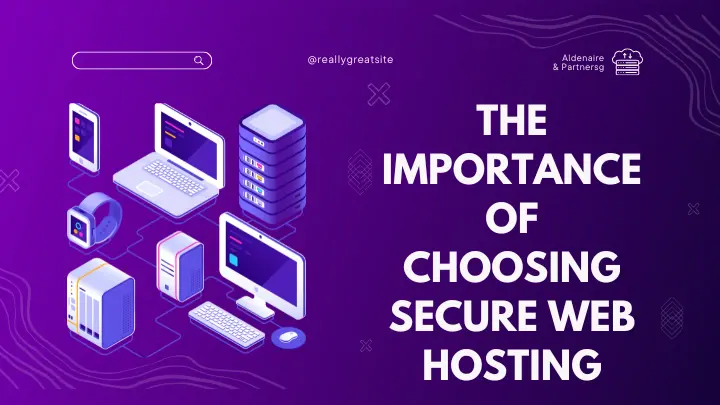The Importance of Choosing Secure Web Hosting
In today’s digital age, where cyber threats are becoming increasingly sophisticated, choosing a secure web hosting provider is crucial for any business or individual looking to establish a strong online presence. Secure web hosting not only protects your website from potential threats but also ensures the safety and privacy of your data and that of your users.

This article will explore why security is paramount in web hosting, the key features to look for in a secure hosting provider, and practical steps to enhance your website’s security.
1. Why Security Matters in Web Hosting
1.1 The Rise of Cyber Threats
Cyber threats such as hacking, malware, and data breaches are on the rise. Attackers are continually developing new methods to exploit vulnerabilities in websites and servers. As the owner of a website, your primary responsibility is to safeguard your site against these threats.
- 1.1.1 Hacking Attempts: Unauthorized access to your website can lead to data theft and loss of control.
- 1.1.2 Malware Infections: Malicious software can compromise your site’s integrity and performance.
1.2 Data Protection and Privacy
A secure web hosting environment is essential for protecting sensitive data, including personal information, financial transactions, and intellectual property. Data breaches not only harm your users but can also lead to severe legal and financial consequences.
- 1.2.1 User Data: Protect personal information and payment details from unauthorized access.
- 1.2.2 Compliance Requirements: Adhere to data protection regulations like GDPR and CCPA.
1.3 Reputation Management
A security breach can damage your reputation, erode customer trust, and lead to loss of business. Ensuring your website’s security helps maintain your credibility and trustworthiness.
- 1.3.1 Trust Issues: Customers are less likely to engage with your site if they perceive it as insecure.
- 1.3.2 Brand Damage: Security incidents can have long-term impacts on your brand’s reputation.
2. Key Features of Secure Web Hosting
2.1 SSL Certificates
An SSL (Secure Sockets Layer) certificate encrypts data transmitted between your website and its visitors, ensuring that sensitive information remains confidential.
- 2.1.1 Encryption: Protects data during transmission and prevents eavesdropping.
- 2.1.2 Trust Indicators: Displays a padlock icon and “https” in the browser address bar, enhancing user trust.
Guide on Setting up SSL for Websites
2.2 Regular Backups
Regular backups ensure that your website data can be restored in the event of a disaster, such as a cyber-attack or server failure.
- 2.2.1 Automated Backups: Schedule automatic backups to ensure regular data preservation.
- 2.2.2 Easy Restoration: Ensure that backups can be easily restored with minimal downtime.
2.3 Malware Scanning and Removal
A secure hosting provider should offer malware scanning and removal services to detect and eliminate malicious software before it can cause harm.
- 2.3.1 Real-Time Scanning: Monitor your website for malware and vulnerabilities in real time.
- 2.3.2 Removal Tools: Provide tools and support for effective malware removal.
2.4 Firewalls and DDoS Protection
Firewalls and Distributed Denial of Service (DDoS) protection help prevent unauthorized access and mitigate attacks aimed at overwhelming your server.
- 2.4.1 Web Application Firewalls (WAF): Filter and block malicious traffic targeting your website.
- 2.4.2 DDoS Mitigation: Protect against attacks designed to disrupt your site’s availability.
2.5 Secure Access Controls
Implementing secure access controls ensures that only authorized users can access critical parts of your website and server.
- 2.5.1 Strong Authentication: Use multi-factor authentication (MFA) for an extra layer of security.
- 2.5.2 Role-Based Access: Restrict access based on user roles and responsibilities.
2.6 Regular Security Updates
Ensure that your web hosting provider applies regular security patches and updates to address known vulnerabilities.
- 2.6.1 Software Updates: Keep server software and applications up to date with the latest security patches.
- 2.6.2 Vulnerability Management: Monitor and address potential security risks promptly.
3. How to Choose a Secure Web Hosting Provider
3.1 Research and Compare Providers
When selecting a web hosting provider, research their security features and compare them against your needs. Look for providers with a strong track record of security and reliability.
- 3.1.1 Reviews and Testimonials: Read customer reviews to gauge the provider’s reputation for security.
- 3.1.2 Security Certifications: Check for certifications such as ISO 27001 or SSAE 16.
3.2 Evaluate Security Features
Assess the security features offered by different hosting providers. Ensure that they align with your security requirements and compliance needs.
- 3.2.1 SSL Certificates: Verify that SSL certificates are included and properly implemented.
- 3.2.2 Backup and Recovery: Ensure that regular backups and recovery options are provided.
3.3 Consider Support and Service Levels
Choose a provider that offers robust support and service levels. Reliable support can be crucial in resolving security issues quickly and effectively.
- 3.3.1 24/7 Support: Look for providers with round-the-clock support to address urgent security concerns.
- 3.3.2 Incident Response: Ensure that the provider has a clear incident response plan for security breaches.
3.4 Check for Compliance
Ensure that the hosting provider complies with relevant data protection regulations and standards.
- 3.4.1 Data Protection Laws: Verify compliance with regulations like GDPR, CCPA, and PCI-DSS.
- 3.4.2 Industry Standards: Adherence to industry security standards and best practices.
4. Best Practices for Enhancing Website Security
4.1 Use Strong Passwords
Implement strong, unique passwords for all accounts and access points related to your website.
- 4.1.1 Password Complexity: Use a combination of letters, numbers, and symbols.
- 4.1.2 Regular Changes: Update passwords regularly to reduce the risk of unauthorized access.
4.2 Enable Two-Factor Authentication (2FA)
Add an extra layer of security by enabling two-factor authentication for all user accounts.
- 4.2.1 Authentication Apps: Use apps like Google Authenticator or Authy for generating secure codes.
- 4.2.2 SMS or Email Verification: Require additional verification via SMS or email.
4.3 Monitor and Audit Your Website
Regularly monitor and audit your website for potential security issues and vulnerabilities.
- 4.3.1 Security Audits: Conduct periodic security audits to identify and address weaknesses.
- 4.3.2 Monitoring Tools: Use tools to monitor for suspicious activity and breaches.
4.4 Educate and Train Your Team
Ensure that your team members are aware of security best practices and potential threats.
- 4.4.1 Security Training: Provide regular training on identifying and responding to security threats.
- 4.4.2 Awareness Programs: Implement programs to keep your team informed about emerging security risks.
5. Conclusion
Choosing a secure web hosting provider is fundamental to safeguarding your website, protecting sensitive data, and maintaining the trust of your users. By prioritizing security features such as SSL certificates, regular backups, malware scanning, and secure access controls, you can mitigate risks and ensure a safer online environment. Additionally, conducting thorough research, evaluating security features, and adhering to best practices will help you make informed decisions and enhance your website’s security posture.
Investing in secure web hosting not only protects your assets but also contributes to the overall success and credibility of your online presence. As cyber threats continue to evolve, staying vigilant and proactive in securing your website is essential for long-term success.
Common Questions
1. What is the role of an SSL certificate in web hosting security?
An SSL certificate encrypts data transmitted between your website and its visitors, ensuring that sensitive information remains confidential and secure from interception.
2. How often should I back up my website?
It is recommended to back up your website regularly, ideally on a daily or weekly basis, depending on the frequency of updates and the importance of the data.
3. What should I look for in a secure web hosting provider?
Look for features such as SSL certificates, regular backups, malware scanning and removal, firewalls, DDoS protection, and strong access controls. Additionally, choose a provider with a good reputation for security and responsive support.
4. How can I enhance the security of my website beyond choosing a secure hosting provider?
Enhance security by using strong passwords, enabling two-factor authentication, monitoring and auditing your website regularly, and educating your team about security best practices.


